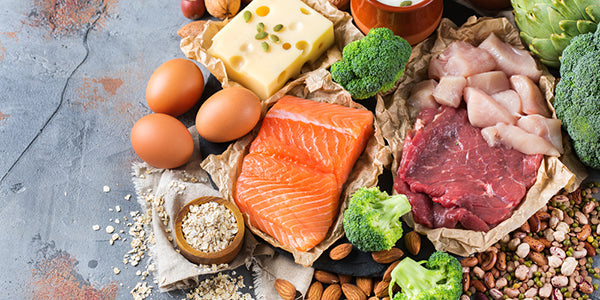
Protein is one of the three macronutrients, with carbohydrates and fat being the other two. 'Macro' essentially signifies the body needs relatively large amounts of it.
Protein is mostly known for its notorious role in muscle synthesis, which supports weight loss by cultivating lean body mass to innately boost metabolism. Protein is also considerably satiating, thus lowering the risk of overeating and controlling caloric intake.
Since protein is found in a wide variety of sources, including animal and plant-based products, obtaining adequate intake and meeting dietary needs to maintain health and lose weight is feasible.
Why Is Protein Important for Weight Loss?
The importance of protein in weight loss stems from a number of factors, including the following reasons and benefits.
Protein Stimulates Muscle Growth
One of the most important roles of protein is its aptitude to repair, grow, and build muscle mass. Displacing fat and sporting greater muscle mass results in a faster metabolism, therefore facilitating a greater calorie burn even when the body is at rest.
It is likewise important to mention muscle is only able to grow in conjunction with consistent strength training and exercise. A high intake of protein in the absence of weight training can subsequently lead to weight gain in the form of fat mass.
Protein Lends Greater Satiety
One of the most prominent components of the importance of protein intake for weight loss and regulation is its ability to offer satiation.
According to data published in the Current Opinion of in Clinical Nutrition and Metabolic Care, protein has shown to be more satiating than carbohydrate and fat in the short and long term.
Decreased hunger rates have also been shown to coincide with higher intakes of essential amino acids, or amino acids that must be obtained through diet, such as leucine, lysine, tryptophan, isoleucine, and threonine.
Protein Regulates Hunger Hormones
A series of hormones regulate hunger and satiety, including gut neuropeptides that induce satiety, including glucagon-like peptide 1 (GLP-1), cholecystokinin (CCK), and peptide YY (PYY), and ghrelin, which is a hormone that stimulates appetite.
The American Journal of Clinical Nutrition reports consuming a high-protein diet has been shown to induce satiating hormones (GLP-1, CCK, and PPY) and reduce ghrelin, which can help control appetite and food consumption.
Protein Curbs Carb Fluctuations
If ever heard to include protein with all meals and snacks, this is why…
Whereas complex carbs and fiber are released slowly, simple and refined carbs cause blood sugar spikes and a subsequent drop, which tends to cause food cravings not so long after.
Pairing protein with carb sources slows down the absorption of sugar from the stomach into the bloodstream, helping to stabilize blood sugars and warding off future cravings.
Protein Increases Energy Expenditure
The "thermic effect of food" (TEF) is the energy the body uses to digest food into smaller, absorbable components. Protein has a higher TEF compared to carbs and fat, which essentially means the body burns more calories through the digestion process than the other two macronutrients.
Protein Enhances Fat Burn
Time and time again, dieters inquire, "Does protein burn fat?" While the explanation is quite intricate, the short answer is yes.
There is a heavy body of evidence supporting the body cannot effectively burn and use fat as energy if it does not have help from either carbohydrate or protein. And without the proper nutrients from each, runs the risk of losing significant portions of precious muscle mass when aiming to shed fat.
Calorie and fat burn, whilst sustaining lean muscle mass, is immensely valuable and aspired for successful and long-term weight loss.
Protein Supplies Metabolic-Supporting B Vitamins
The majority of lean proteins are rich in B vitamins. While each of the eight essential B vitamins has its own set of functions, they cohesively provide the body with energy and helps metabolic processes function at their prime.
How Much Protein for Weight Loss?
Protein intake recommendations vary based on a number of factors, including age, weight, gender, and activity levels, though adults are often encouraged to consume at least 10 to 35 percent of total daily calories from protein sources.
Furthermore, the dietary reference intake (DRI) for protein is 0.8 grams of protein per kilogram (g/kg) of body weight, which amounts to at least 56 and 46 grams per day for men and women, respectively.
And despite the popularity of a high-protein, low-carb diet, there is evidence detailing diets high in protein but containing a normal adequate carbohydrate have been successfully used to improve metabolic parameters, suggesting that weight-maintenance depends on the protein content but not necessarily on a low carb diet.
Ultimately, though, tailor needs to match personal goals. A Registered Dietitian can help determine just how much protein one needs to not only lose weight, but maintain and potential grow supportive muscle mass.
High-Quality Protein Diet for Weight Loss
Along with consuming adequate protein, it is imperative to achieve recommendations through high-quality products. So instead of choosing bacon, hot dogs, other processed meats, opt for the following lean meats and fish to reduce unwanted fat, salt, and additional preservatives:
• Beef Sirloin: 19 grams per 3 ounces
• Chicken: 17 grams per 3 ounces
• Eggs: 6 grams per 1 medium egg
• Shrimp: 19 grams per 3 ounces
• Tilapia: 23 grams per 1 cooked fillet
• Tuna: 25 grams per standard can
Milk and dairy products are rich sources of protein and calcium. Although research suggests consuming full-fat and whole products may not be as concerning as once believed, individuals watching calorie intake may benefit from choosing "low-fat" or "fat-free."
• Dairy Milk: 8 grams per 8-ounce cup
• Greek Yogurt: 20 grams per 1 cup grams (beware of added sugars)
• Cottage Cheese: 13 grams per ½ cup
Whether following a vegetarian lifestyle or simply trying to reduce meat intake, plant-based proteins are valuable meat alternatives whilst often supplying healthy fat and fiber. Shake up standard meat dishes with:
• Black Beans: 19 grams per 1/2 cup
• Lentils: 9 grams per 1/2 cup boiled
• Peanut Butter: 8 grams per two tablespoons
• Quinoa: 4 grams per 1/2 cup cooked
• Soybeans: 22 grams per 1 cup boiled
• Tempeh: 31 grams per 1 cup
• Tofu: 20 grams per 1 cup
If looking for a food strategy that works without feeling restricted or confined, let bistroMD assist! bistroMD is the nation's leading meal delivery service and provides well-balanced meals across the country.
Each meal supplies 40 percent of total caloric intake from lean, adequate protein, 30 percent of calories from healthy fats, and 30 percent from complex carbohydrates. The balance of macronutrients provides the body with vital nutrients to jump-start healthy weight loss.
The Final Word on Protein for Weight Loss
Being a macronutrient, protein is essential for overall health. Protein is likewise key for weight loss, especially due to the thermic and metabolic impacts it facilitates.
To maximize protein for weight loss, consume lean, high-quality sources and ensure daily requirements. A healthcare professional, such as a dietitian, can help determine individual protein targets based on personal needs and goals.








